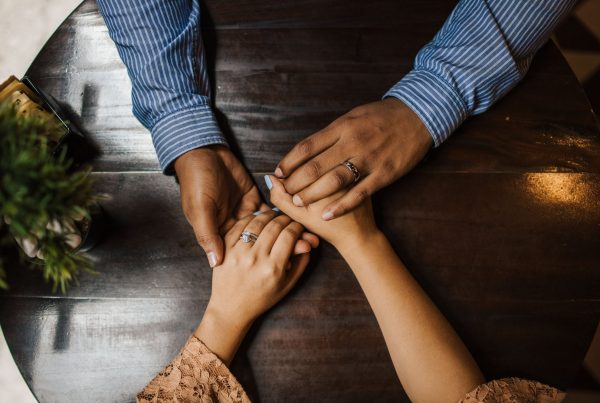The concept of having “boundaries” may not be very popular in cultures that are more communal than individualistic (like most Asian cultures for example). Even if there are, it’s not something that is often talked about. Yet, it’s interesting to see how boundaries are subtly practised in such societies – especially in a marriage.
For a recap on the definition of “boundaries in marriage”, read this article first.
So out of curiosity, we interviewed some married Malaysians who each come from different ethnic backgrounds, and we asked them how they manage boundaries with their spouse. We organise this into five different areas where boundaries can be exercised: Personal space, conflicting emotions, friendships, managing in-laws, and finances. Some of them have chosen to use a pseudonym for privacy.

Photo by Michael Longmire on Unsplash
On Finances
I believe marriage is becoming a unit. For a unit to function in excellence, then both parties need to agree on the term of service and trust. So
every decision and action is based on the fact that we are both at service to each other and we both trust in each other’s actions in order to live with the outcomes and consequences.
We are Muslims and the simple rule in finance is that the man provides and the woman’s money is 100% hers. Sounds like a simple rule, but when the core of the rule is understood, a lot of honor comes with it. I never have to think about bills for ‘necessities’ but I pay bills that come out of fancy (ie. my personal credit card, mobile phone, my splurging and shopping).
When I contribute to the necessities, he says ‘thank you’. When money is borrowed, it is returned without negotiation or hesitation. Our money matters are transparent but we don’t really focus our conversation on it because of the concept of rezqi. And because our money is not segmented into categories or who is responsible for what, because it is predetermined by faith – our financial conversations have been quite fluid from day one.
– Syireen, 40s, Kuala Lumpur
On Relating to the In-laws
I come from a different race from my in-laws and that posed a huge problem for them during our courtship and subsequent marriage. As a result of that experience, my husband grew more protective of me and our little family. He also saw how his father often stood up for his mother as she too, had a long-standing feud with her mother-in-law. I think that might be how he learned to stand up for me and take my side, provided it is within good reason.
Even then,
I try to remember that whenever I do have disagreements with my in-laws, these are still the same people who brought my husband up to be the man I grew to love.
Surely, they have his / our best interest at heart, right?
– Tasha, 30s, Petaling Jaya

Photo by Muhammad Haikal Sjukri on Unsplash
On Personal Space
With my husband suffering from depression and anxiety, I have had to reorganise my priorities: To draw the line and say no to a lot of activities. This is a season when my husband needs me, and I am choosing to prioritise him. I know that he would do the same for me. Having said that, it’s not been easy.
On flights they always say, ‘Put your oxygen mask on before attending to those under your care.’
Whether or not you’re a caregiver to your spouse, it’s always a good idea to take care of yourself so you can give your best to your spouse.
I used to go for massages and facials but the pandemic put a stop to that. My husband started giving me foot massages while we’re putting the kids to bed, and I have to say he’s gotten really good at that! It’s a quick way for us to reconnect and for me to destress and feel pampered after a long day.
I also signed up for classes online. Once a week, take time out to do something that interests you; it could be a writing class, or an art class.
– Meg, 40s, Kuala Lumpur
I think my husband and I recognise that it’s so important to have time to be alone to reflect, think, and pray. Because it is in those times, our own tanks are filled and we can come out refreshed, renewed and ready to give to each other and the family again.
So, I will ensure that the kids and I don’t disturb him when he needs his quiet time.
When I communicate that I need my own time, he will do the same for me.
As a mom, sometimes, my time is very easily “stolen” from me by my children, so my husband would sometimes check with me if I need time and would offer to adjust his schedule so that I can have my tank filled. I really appreciate that he helps me protect my time.
– Luisa, 40s, Kuala Lumpur

Photo by Eric Ward on Unsplash
On Conflicting Emotions
When dealing with conflicting issues, it is easy to get carried away with emotions thinking that our own perspective is always right, particularly when emotions are high. Personally, I feel that…
A lot of misunderstandings stem from not being able to distinguish ego over truth, and not knowing when to take a step back when you know you are in the wrong.
Creating healthy boundaries in conflicting issues is to understand that both perspectives can be discussed and heard, and a consensus can be reached once all the variables are understood.
I typically would choose to not talk about these issues during the heat of the moment and let it cool down before responding. This applies to both emotional and logical perspectives, which can sometimes be difficult to separate. Listening and acknowledging perspectives go a long way, even more when we have each other’s best interest at heart.
– Nuddin, 30s, Malaysian living abroad

Photo by Afif Kusuma on Unsplash
On Friendships
Firstly, I’d like to say that I think a boundary is neither good or bad on its own and it really serves no purpose unless we know why we have it.
I have realised most times in life boundaries exist where there could be conflict, so rather than creating boundaries to keep that area healthy while apart, we are intentionally focused on creating healthy spaces where we can grow together.
My wife and I had two totally different sets of friends growing up. However we knew each other for a few years prior to marriage and had some common friends. I had to be intentional in excluding others for a season to ensure our relationship was strong before navigating the complexities of prior friendships – especially with the opposite sex.
We were blessed when we first got married as we moved to a different city. That was a blessing in disguise as we really only had each other and we learnt to develop our bond and trust much quicker without influence from others. Being in a new place, over time we were very intentional about developing common friendships with people that we were both comfortable with. We understood that our existing friendships with people prior to our marriage still had a role to play in our lives and have together pursued the ones that we both feel are good for us as a couple and not as individuals.
Our marriage vows say they shall no longer be Two but One. There are friendships that have become stronger because we have been accepted as a couple. There are some that have not yet been revived yet and there will be some that never will. Our marriage, which currently is just the two of us and by God’s grace someday our children as well, is a priority. The only healthy boundary in this scenario is when any one of us does not feel like the third wheel with someone else present.
– David, 40s, Malaysian living abroad
According to psychologists, having boundaries simply means “knowing how to honour ourselves as a separate individual with needs and wants that often differ from others. Without healthy boundaries, we allow others to override our own feelings and desires.” (John Amodeo Ph.D., MFT)
One thing that’s great to see from all these stories is how different couples exercise or view boundaries in their own way. Marriage is a social construct and so it is normal to see and understand it through the lenses of our cultural background, our parents’ influence, and our religion or faith. What’s important is knowing that this lifetime commitment is one that brings growth and joy to both of you. And to do that, it takes work and… as we have seen, some form of boundaries too!
Big thanks to everyone who contributed their personal stories to this article.
Let us know your thoughts in the comments below and stay tuned for the follow up article.
Featured image by stories.my




